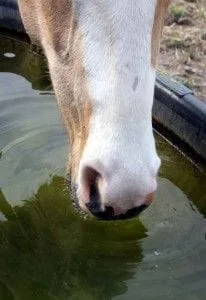
A horse needs to drink an average of eight to 12 gallons of water a day to stay healthy, yet when the temperatures are below freezing, he may take in considerably less. If you're seeing less manure, and the balls seem drier than normal, your horse may be at risk of an impaction colic as well as other health issues stemming from dehydration.
To make sure your horse has enough to drink, check his water sources at least twice daily to break up or remove ice. An electric teakettle kept at the barn can be an efficient way to thaw frozen buckets. Offering a bucket of water with dissolvable electrolytes, in addition to a bucket of plain water, may stimulate a horse to drink more. Also consider the order in which you do your barn chores. Horses tend to drink more after they've just eaten dry hay or grain. Doling out the feed first, then refilling the water buckets after they've been munching for a few minutes, may encourage them to consume more water.
If you use immersion heaters to prevent water from freezing, stick your ungloved fingers into the bucket each day to make sure the water is remaining above freezing but not getting too warm. Horses tend to drink less when the water temperature gets above 65 degrees Fahrenheit. If you feel a tingling sensation, check your wiring for shorts. The electricity flowing through the water may be deterring your horse from drinking.
Do not rely on your horse getting enough water by eating snow. He could never eat enough to get as much water as he needs, and heating up all that ice to body temperature would cost him a considerable amount of his internal heat.
